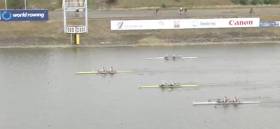Displaying items by tag: Ciara Browne
Moynihan and Browne Miss Out in Close Race at World Junior Rowing
#Rowing: Ireland’s Ciara Moynihan and Ciara Browne finished third in their repechage of the junior women’s double at the World Junior Championships in Racice this morning. There were two spots available in the A/B semi-final, and Britain and Japan held them as the crews passed the 1750 metre marker. Moynihan and Browne sprinted hard to the line but could not quite catch second-placed Japan.
The Ireland double’s time would have put them through in two of the other three repechages. They go on to the C/D semi-finals.
The Ireland pair of Eliza O’Reilly and Gill McGirr qualified for the A/B semi-finals, while the men’s quadruple also face into C/D semi-finals.
World Junior Rowing Championships, Racice, Czech Republic (Selected Results)
Men
Quadruple – Repechage Two (First Two to A/B Semi-Finals; rest to C/D Semi-Finals): 1 Denmark 5:52.45, 2 Chile 5:56.25, 3 Ireland (L Hayes Nally, A Byrne, J Dorney, J Keating) 5:58.73.
Women
Pair – Repechage (First Three to A/B Semi-Final; rest to C Final): 1 France 7:25.97, 2 Hungary 7:29.32, 3 Ireland (E O’Reilly, G McGirr) 7:31.49.
Double – Repechage Four (First Two to A/B Semi-Finals; rest to C/D Semi-Finals): 1 Britain 7:12.35, 2 Japan 7:14.36; 3 Ireland (C Moynihan, C Browne) 7:15.23.
#Rowing: The Workmen’s junior women’s double took a silver at the National Schools’ Regatta at Dorney Lake in England today. In the Championship Doubles, Annie O’Donoghue and Ciara Browne finished one and a half lengths down on Latymer Upper School. Ciara Moynihan of Workmen’s finished seventh in the A Final of the Championship Singles, while Molly Curry of Coleraine Grammar School took control of the B Final and won.
Enniskillen took silver in the Boys’ Non-Championship Eights, and their girls’ junior 16 coxed four matched them in their A Final. Ireland clubs placed second and third in the B Final of the Girls’ Championship/Non Championship Eights.
British National Schools’ Regatta, Dorney Lake (Selected Results; Irish interest)
Saturday
Boys
Championship/Non-Championship Eight – B Final: 3 Enniskillen RBC.
Girls
Championship/Non-Championship Eight – B Final: 2 Galway 7:35.72; 3 St Michael’s 7:45.46.
Junior 16 Four, coxed – A Final: 2 Enniskillen RBC 8:22.68.
Sculling, Double – Championship A Final: 2 Workmen’s (A O’Donoghue, C Browne) 8:06.37.
Single – Championship A Final: 7 Workmen’s (C Moynihan) 9:10.40. B Final: 1 Coleraine Grammar School (M Curry) 8:43.03.





























































